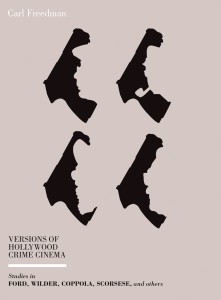Versions of Hollywood Crime Cinema
Studies in Ford, Wilder, Coppola, Scorsese, and Others (livre en anglais)


Moyenne des votes : ![]()
| 0 | vote | |
| 0 | vote | |
| 0 | vote | |
| 0 | vote |
Votre vote : -
Description de l'ouvrage :
No society is without crime, prompting Nathaniel Hawthorne’s narrator to make his famous statement in The Scarlet Letter that, however high its hopes are, no civilization can fail to allot a portion of its soil as the site of a prison. Crime has also been a prevailing, common theme in films that call us to consider its construction: How do we determine what is lawful and what is criminal? And how, in turn, does this often hypocritical distinction determine society?
Film, argues Carl Freedman, is an especially fruitful medium for considering questions like these. With Versions of Hollywood Crime Cinema, he offers a series of critical readings spanning several genres. From among the mob movies, Freedman focuses on Francis Ford Coppola’s Godfather trilogy—arguably the foremost work of crime cinema—crafting a convincing argument that the plot’s action is principally driven by the shift from Sicily to America, which marks the shift to a capitalist society. Turning his attention to other genres, Freedman also looks at film noir and Westerns, in addition to films for which crime is significant but not central, from horror movies like Stanley Kubrick’s The Shining to science fiction and social realist films like The Grapes of Wrath. In recent years, television has welcomed innovative works like Boardwalk Empire, The Wire, and The Sopranos, and Freedman discusses how television’s increasingly congenial creative environment has allowed it to turn out productions whose ability to engage with these larger social questions rivals that of films from the height of cinema’s Golden Age.
Revue de Presse :
"Whether discussing the ’post-heterosexuality’ of John Wayne or the role of what Marx called ’primitive accumulation’ in the Godfather films, Carl Freedman offers thought-provoking new insights on classic Hollywood films."
Steven Shaviro, Wayne State University
"Carl Freedman once more proves himself the most sensitive reader of texts and the most lucid explicator of critical theory. It is a commonplace that mob movies expose the logic of capitalism, but his nuanced analysis of the Godfather trilogy in terms of Marx’s concept of primitive accumulation for once actually makes the case—and makes it stick. Freedman’s inclusion of westerns in crime cinema merely appears idiosyncratic—Edwin S. Porter’s The Great Train Robbery was seen as a violent crime movie long before anyone called it a western—and his consummate discussion of John Wayne’s post-heterosexual masculinity is worth the price of admission alone."
Mark Bould, University of the West of England
Voir le site internet de l'éditeur Intellect Books
> Du même auteur :
American Presidents and Oliver Stone (2020)
Kennedy, Nixon, and Bush between History and Cinema
Sujet : Réalisateur > Oliver Stone
> Sur un thème proche :
Street Smart (2005)
The New York of Lumet, Allen, Scorsese, and Lee
Sujet : Les Films > Sélections de films
Film Mavericks in Action (2016)
New Hollywood, New Rhetoric, and Kenneth Burke
de Alan Taylor
Sujet : Pays > Etats-Unis
Hollywood's Italian American Filmmakers (2011)
Capra, Scorsese, Savoca, Coppola, and Tarantino
Sujet : Pays > Etats-Unis